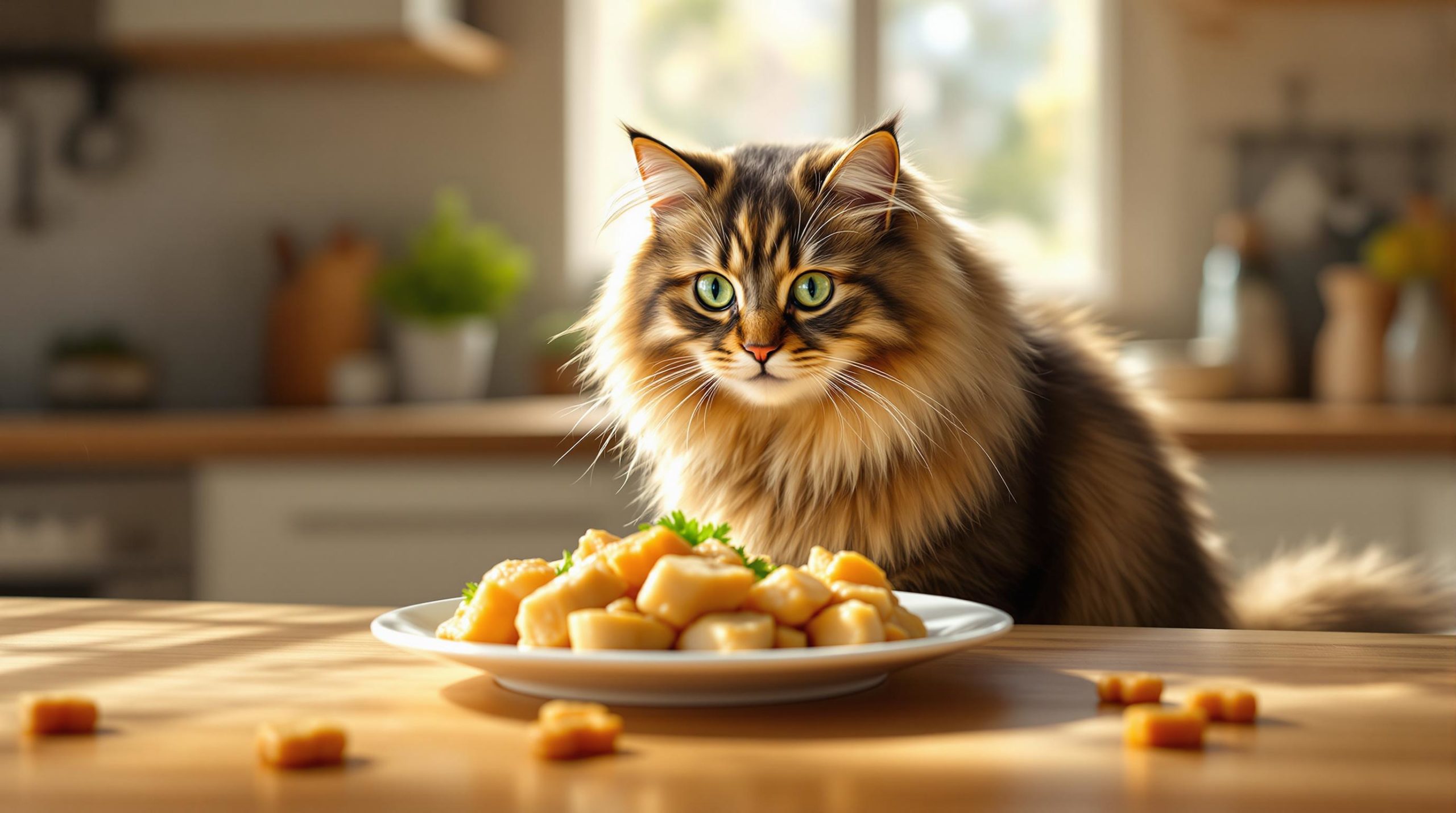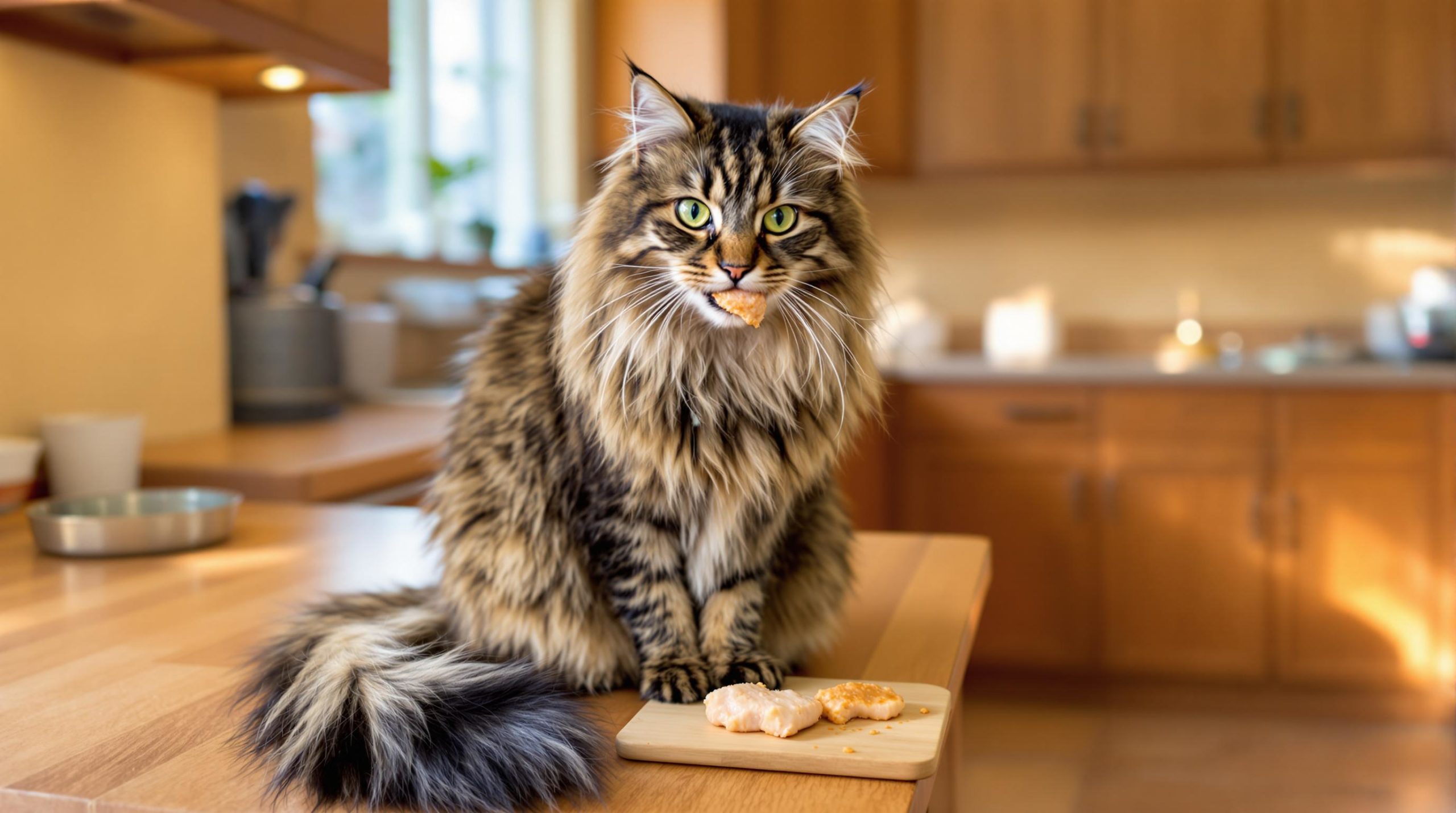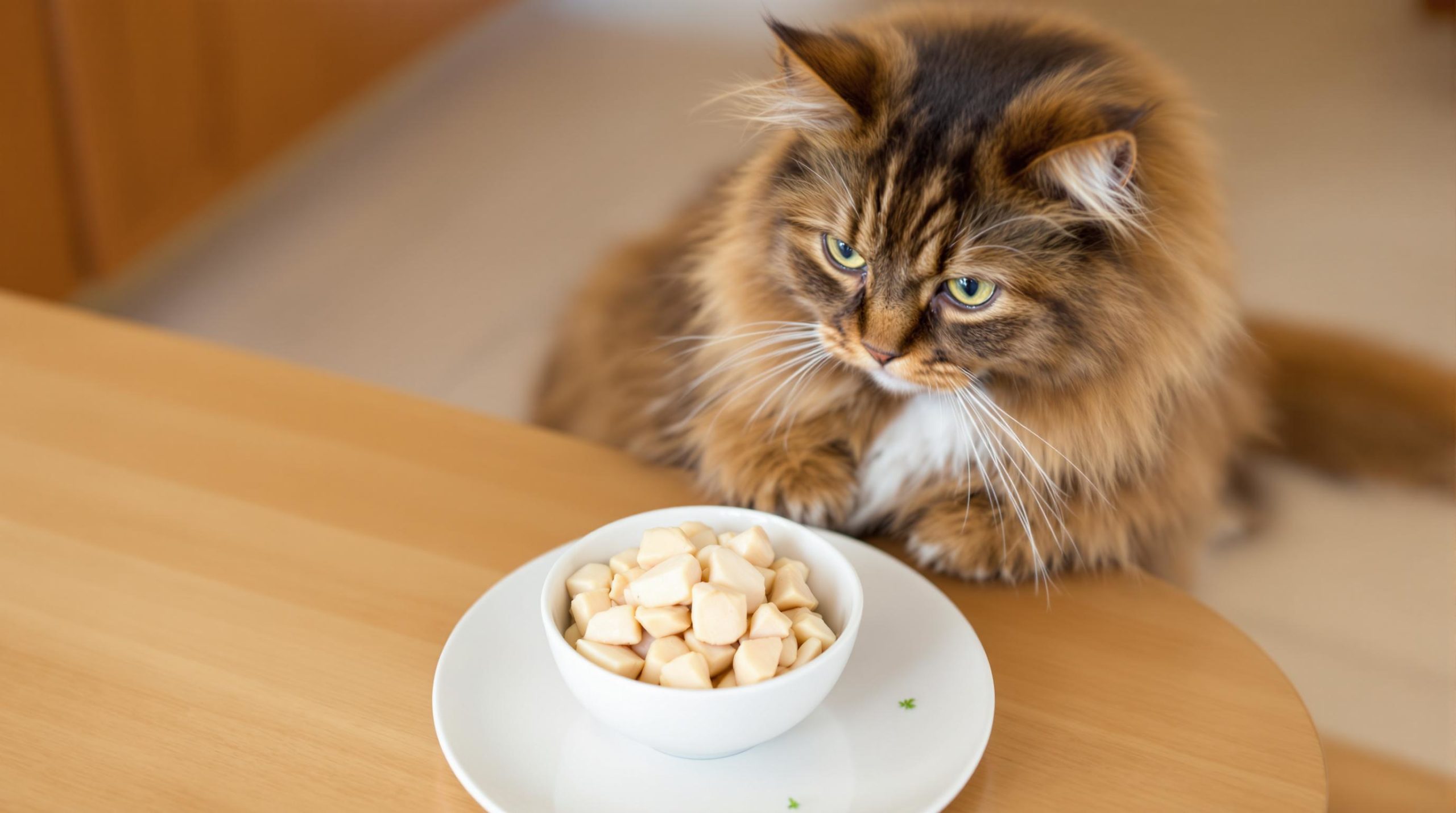Is it safe for Maine Coons to enjoy cooked chicken?

Did you know Maine Coons, the gentle giants of the feline world, can safely enjoy cooked chicken as a tasty treat? Many cat owners wonder whether sharing their own meals with their furry companions is a good idea, especially with such a beloved protein as chicken. While cooked chicken can be a nutritious and enjoyable snack for Maine Coons, pet safety and proper cat nutrition must always come first. This guide explores the ins and outs of feeding cooked chicken to these majestic cats, ensuring their wellbeing remains top priority.
Understanding Maine Coons’ Dietary Needs: Why Cooked Chicken Can Be a Healthy Treat
Maine Coons are the largest domesticated cat breed, known for their robust size and playful spirit. Originating from the chilly climates of Maine, USA, these cats were once natural hunters, feasting on birds, rodents, and small animals to sustain themselves. Today, they rely largely on carefully balanced commercial diets designed to meet their unique nutritional requirements. However, many owners wonder if cooked chicken can supplement their Maine Coon’s meals safely and beneficially.
Cooked chicken is a protein powerhouse, playing a vital role in feline health. Protein is crucial for muscle development, tissue repair, and energy production. Maine Coons especially benefit from high-protein diets due to their larger size and active lifestyles. Additionally, cooked chicken contains important vitamins and minerals such as vitamin B6, iron, zinc, copper, and vitamin B12, all supporting metabolic functions and overall feline wellness.
Still, moderation is key when incorporating cooked chicken into your cat’s diet. While it’s a wonderful source of essential nutrients, it should never replace a complete meal from trusted brands like Purina Pro Plan, Royal Canin, or Hill’s Science Diet. These premium foods offer precisely balanced amounts of carbohydrates, fats, proteins, vitamins, and minerals necessary for Maine Coons to thrive.
- High protein content supports muscle growth and repair.
- Rich in vitamin B6 which aids metabolism and nervous system health.
- Contains minerals like zinc and iron crucial for skin and coat health.
- Low in carbohydrates, aligning well with a carnivorous diet.
- Boosts energy for active Maine Coon lifestyles.
| Nutrient | Benefit for Maine Coons | Found in Cooked Chicken |
|---|---|---|
| Protein | Muscle development & energy | High |
| Vitamin B6 | Metabolism & nervous system support | Moderate |
| Zinc | Skin & coat health | Present |
| Iron | Oxygen transport in blood | Present |
Feeding your Maine Coon cooked chicken enhances their diet safely when done correctly, but the way chicken is prepared and served is critical to pet safety and overall feline wellness.

Safely Preparing Cooked Chicken for Maine Coons: Best Practices to Avoid Risks
Prepared right, cooked chicken can be a healthful delight for Maine Coons. However, some common cooking habits can unintentionally put your cat at risk of digestive upset or worse. Pet safety first is always the golden rule.
The most important rule? Never add seasoning, salt, onions, garlic, or any spices to the chicken. Many common kitchen ingredients are actually toxic to cats, including garlic and onions, which can cause severe health problems even in small amounts.
Another critical concern is bones. Cooked chicken bones become brittle and can splinter easily under chewing. These shards pose a dangerous choking hazard or can cause injury inside the mouth, throat, or intestinal tract. Avoid chicken with bones entirely to protect your Maine Coon.
To prepare perfectly safe cooked chicken:
- Use plain, skinless chicken breast or lean parts.
- Boil or bake the chicken in water or unsalted broth.
- Cook thoroughly to an internal temperature of at least 170°F (77°C), ensuring no pink remains.
- Let the chicken cool before serving bite-sized pieces.
- Avoid frying or using oils; fatty foods can upset your cat’s digestion.
Keeping chicken plain ensures you avoid additives that might harm your Maine Coon. Also, plain boiled chicken contains fewer calories and fats but packs plenty of protein. Check out this resource for more about common health concerns affecting Maine Coons and dietary tips.
| Preparation Step | Reason | Tip |
|---|---|---|
| Boiling Plain Chicken | Retains nutrients without adding toxins | Use unsalted water or sodium-free broth |
| Remove Skin and Bones | Prevents choking and avoids unhealthy fats | Trim fat before cooking for lean protein |
| Avoid Seasonings | Many seasonings are toxic to cats | Offer plain, unseasoned servings only |
| Cook Thoroughly | Kills harmful bacteria and parasites | Ensure internal temp reaches 170°F (77°C) |
Remember, the goal is to prepare chicken as a supplement, not a staple. Feeding processed or fried chicken like nuggets is a definite no-no, full of fat, salt, and unhealthy additives.
Balancing Treats and Meals for Maine Coons: How Much Chicken Is Safe?
While cooked chicken can be a delightful bonus, balancing your Maine Coon’s diet overall is fundamental to their health and vitality. Experts recommend that treats, including cooked chicken, should comprise no more than 10-20% of your cat’s daily caloric intake.
Your Maine Coon’s caloric needs depend on factors like weight, age, activity level, and health status. On average, a typical adult Maine Coon weighs about 15 pounds and requires roughly 450 calories per day.
| Cat Weight | Daily Calorie Needs | Recommended Chicken Treat Calories (max 20%) | Approximate Cooked Chicken Portion |
|---|---|---|---|
| 10 lbs (4.5 kg) | 300-350 kcal | 60-70 kcal | 2 – 2.5 ounces (56-70 g) |
| 15 lbs (6.8 kg) | 450 kcal | 90 kcal | 3 ounces (85 g) |
| 20 lbs (9 kg) | 600 kcal | 120 kcal | 4 ounces (113 g) |
Note that kittens or senior Maine Coons may have differing requirements. Kittens need more calories for growth, while older cats often require fewer. Overweight cats should have fewer treats to prevent further weight gain. For specialized diets addressing conditions like allergies or diabetes, treats might be limited to 10% or less of daily intake; visit this guide for managing Maine Coon weight safely.
- Limit cooked chicken treats to no more than 20% of daily calories.
- Adjust treat servings based on your cat’s health and activity.
- Nutritionally balanced commercial foods should remain the diet cornerstone.
- Introduce cooked chicken treats gradually and monitor for any reactions.
- Maintain variety to keep your cat interested and nourished.
Rotating variety also prevents diet boredom and promotes a well-rounded spectrum of nutrients, complementing their staple foods like Blue Buffalo or Nutrish formulas tailored for feline nutritional needs.
Common Mistakes When Feeding Cooked Chicken to Maine Coons and How to Avoid Them
Despite the popularity of cooked chicken as a feline treat, some pitfalls can compromise your Maine Coon’s health if not avoided carefully.
- Feeding chicken with bones: Avoid any chicken bones to prevent choking or internal injuries.
- Using seasonings: Garlic, onions, and salt are dangerous and should never be added to your cat’s food.
- Overfeeding chicken: Too much chicken can cause nutritional imbalances or excessive calories.
- Relying on chicken as a meal replacement: Always use cooked chicken as a treat, supplementing a complete diet, not replacing it.
- Feeding fried or processed chicken: Fried chicken and nuggets are too fatty and high in sodium, which harm feline health.
Ever heard of chicken skin being safe for cats? Though not toxic, chicken skin contains high oils and fats that can be tough for Maine Coons to digest. Stick to lean meat without skin, cutting down on unnecessary fats to support their health and weight management, particularly if your cat faces conditions like hip dysplasia or arthritis; learn more about health care at Maine Coon Health Problems.
In addition, canned chicken breast can be convenient but ensure it contains no added salt or spices. Always check the label to maintain pet safety.

All About Maine Coons and Their Love for Chicken: Tips for Feline Wellness Enthusiasts
Many Maine Coon owners delight in sharing safe treats with their furry companions, strengthening the human-animal bond. Cooked chicken, when served correctly, can be a valuable tool for rewarding good behavior and adding variety to their diet.
To help Maine Coons enjoy chicken safely, here are expert tips:
- Always introduce new foods gradually to spot any allergies or sensitivities.
- Pair chicken treats with veterinarian-approved diets like Royal Canin or Specialized Allergy Solutions tailored for Maine Coons with sensitivities.
- Use chicken treats as part of training routines or to encourage physical activity.
- Keep fresh, clean water available at all times to assist digestion and hydration.
- Ensure proper grooming to handle shedding and maintain the luxurious Maine Coon coat; for help, see shedding tips.
Providing chicken treats thoughtfully supports overall feline wellness, reinforcing good health while indulging their carnivorous nature. To truly meet their nutritional needs and encourage longevity, regular checkups and balanced nutrition remain essential. Explore more on Maine Coon lifespan and care at Maine Coon Lifespan.
| Tip | Reason | Example/Action |
|---|---|---|
| Introduce chicken gradually | Monitor for allergies or digestive upset | Start with small pieces and observe behavior |
| Feed as treat, not meal replacement | Maintain balanced nutrition for Feline Wellness | Limit chicken to less than 20% of daily diet |
| Choose unseasoned, lean meat | Avoid toxins and manage weight | Serve boiled or baked chicken breast without skin |
| Partner chicken treats with commercial cat food brands | Ensure comprehensive nutrient intake | Use alongside Purina Pro Plan or Hill’s Science Diet |
| Use treats in training or bonding | Encourages positive behavior and exercise | Reward with small pieces during playtime |
FAQ About Feeding Cooked Chicken to Maine Coons
- Can Maine Coons eat cooked chicken every day? Yes, but only as a treat making up no more than 20% of their daily diet to ensure balanced nutrition.
- Is it safe to feed chicken bones to Maine Coons? Never. Cooked chicken bones can splinter and cause serious injury or death.
- Can kittens eat cooked chicken? Yes, from about 8 weeks old, but in very small, carefully monitored portions.
- Is chicken skin safe for Maine Coons? While not toxic, chicken skin is fatty and can cause digestive upset, so it’s best to avoid it.
- What types of commercial cat foods complement chicken treats? Brands like Royal Canin, Purina Pro Plan, Hill’s Science Diet, Nutrish, and Blue Buffalo offer balanced nutrition essential for Maine Coons.